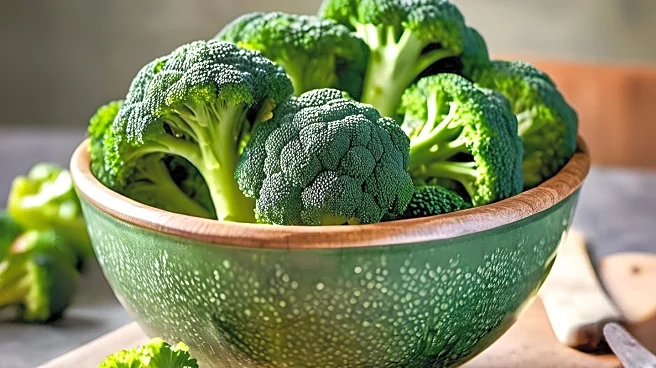What is the story about?
What's Happening?
Recent research underscores the cancer-fighting properties of cruciferous vegetables, such as cabbage, cauliflower, and kale, which are linked to a reduced risk of colorectal cancer. The study, involving approximately 600,000 participants across 17 observational studies, found that consuming 20 to 40 grams of these vegetables daily is associated with a 17% lower risk of developing colorectal cancer. Cruciferous vegetables contain powerful antioxidants known as glucosinolates, which help neutralize toxins and reduce inflammation. The study also highlights the presence of bioactive compounds like sulforaphane and indole-3-carbinol, which support detoxification and hormone regulation, respectively. However, the research notes a plateau effect beyond 40 grams per day, where higher intake does not yield additional benefits and may cause minor digestive issues.
Why It's Important?
The findings are significant as they provide a dietary approach to potentially reduce the risk of colorectal cancer, one of the most common and deadly cancers worldwide. With approximately 900,000 deaths annually from this disease, incorporating cruciferous vegetables into daily diets could have a substantial public health impact. The study reinforces the importance of diet in cancer prevention and supports existing knowledge about the health benefits of vegetables. This research could influence dietary guidelines and public health policies, encouraging increased consumption of these vegetables to improve health outcomes.
What's Next?
While the study provides compelling evidence, it is based on observational data, which means further research is needed to establish a direct cause-and-effect relationship. Future studies could focus on controlled trials to confirm these findings and explore the mechanisms by which these vegetables exert their protective effects. Additionally, public health campaigns may be developed to promote the consumption of cruciferous vegetables as part of a balanced diet. Healthcare providers might also consider recommending these vegetables to patients as part of cancer prevention strategies.
Beyond the Headlines
The study highlights the broader implications of diet on health, emphasizing the role of natural, unprocessed foods in disease prevention. It also points to the potential for dietary interventions to complement traditional medical treatments. The research may spark interest in further exploring the benefits of other vegetable groups and their specific compounds. Additionally, it raises awareness about the limitations of self-reported dietary data and the need for more accurate methods of dietary assessment in research.
















